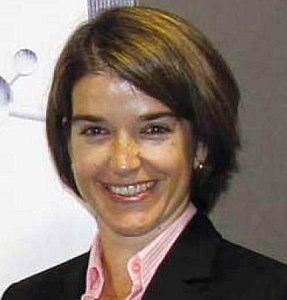
Dr Michelle Carr, director, Telezon, Australia
Australia-based Telezon Limited's CoreIT and SoloFlow Reconstitution Needle technology have already made a mark for itself in the market that is dominated by steel needles. Led by its director, Dr Michelle Carr, the company has already secured two commercial arrangements for sale and supply of its SoloFlow Non-Injection Needle in India and is currently seeking investment in order to accelerate commercialization of its products and technologies in the global market.
In an interview with BioSpectrum, Dr Carr highlights the key technology differentiator of Victoria-based Telezon's portfolio and shares the firm's market agenda.
How has the market reacted to the launch of Telezon's CoreIT Technology and the SoloFlow Reconstitution Needle?
CoreIT technology and SoloFlow Reconstitution Needle have both been very well received by the market. CoreIT is an advanced moulding technology that enables plastic cannula to be precision moulded and SoloFlow Needle is used only for the draw-up or mixing drugs.
We have found that market interest across our portfolio has significantly increased since the launch. Our portfolio includes PolyDermic (plastic hypodermic or injection needle), Blunt SoloFlow (blunt draw-up/application needle) and a unique range of drug delivery needle solutions. This technology offers companies the opportunity to reduce processing time without compromising on quality.
How are the products positioned in the market?
Dr Carr: So far, the needle market has been dominated by steel needles that cater to drug delivery and drug reconstitution. Among our products, Telezon's SoloFlow has been positioned in the market against steel needles in certain applications. Although the market is tightly held by steel needles, we have noticed that there is a demand in some markets for cheaper, easy-to-use and disposable, safer alternatives to steel.
The benefits of our plastic needles are their safety features, ease-of-recyclability and a more cost efficient lifecycle (from production to disposal), as compared to steel. Furthermore, it does not interfere with medical imaging technologies and our range can be customized for both human and animal use, as well as medical and non-medical applications.
What is your go-to-market strategy?
We brought this technology and product to market, culminating in FDA registration, in a speedy cycle of 15 months. One of the roles of the CoreIT Technology and the SoloFlow Reconstitution Needle is to demonstrate to the market that a non-injection plastic needle can perform well against its steel counterpart and offer benefits of cost competitiveness, recyclability and safer practice.
We have continued to discuss our technologies and benefits with prospective organizations globally such as pharmaceutical companies looking for drug delivery solutions. Our technology is the differentiator in this crowded market.
What is the revenue forecast for 2013?
Telezon is at a very exciting time at this juncture. It is currently seeking investment to accelerate commercialization of its products and technologies in the global market. In addition, this investment will also support our existing commercial agreements, two of which are with Indian companies. So, it will be safe to say that we have a positive financial outlook for 2013.
Which geographies are you focusing on?
Our portfolio is relevant to markets globally. India is our first market. We are currently supplying the SoloFlow Needle technology to the Serum Institute of India (SII). Growing healthcare industry and large market in India, provides us with substantial opportunity. Discussions with Indian companies and healthcare providers have been positive and they have demonstrated considerable interest. We also have a commercial agreement with India's Hindustan Syringes and Medical Devices (HMD), the manufacturers of Dispovan syringes.
Moreover, we have entered into contract-manufacturing agreements with organizations in Germany and Switzerland. We have also been contacted by, and are in discussions with, a number of organizations globally. Furthermore, Telezon has also been acknowledged by the World Health Organization (WHO) for SoloFlow's benefits of being safer and recyclable, as it addresses the growing worldwide demand of safer injection units.
Can you elaborate on the experience of partnering with Indian companies?
Working with our Indian partners has been both an interesting and very worthwhile experience until date. We have been able to work with them and leverage opportunities for both parties. Our partnerships are based on open communication that has fostered a very close working relationship.
For example, while providing SII with SoloFlow, the entity was modified to meet their particular project specifications. This close collaboration with SII has enabled both organizations to achieve their respective objectives. Our ability to listen, discuss and then design or modify products in order to provide market solutions is one of our core strengths. We continue to enjoy an open dialogue that fosters a good, productive relationship that delivers commercial benefit.




